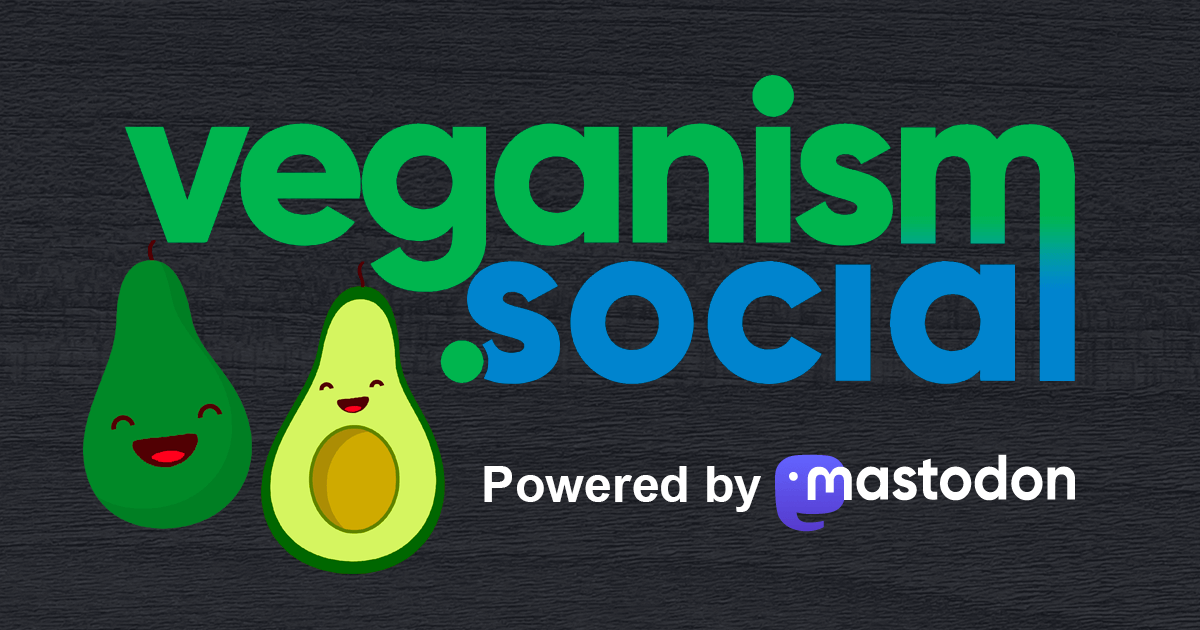Ofis Publik ar Brezhoneg<p>🎙️ Penaos krouiñ ur gont e Common Voice ? Displegañ a reomp dit er video-mañ !<br>🔍 C'hoant az peus da c'houzout hiroc'h diwar-benn Common Voice e brezhoneg ? Na chom ket etre daou, ne'z peus nemet koumanantiñ d’hor pajenn !</p><p>🎙️ Comment créer un compte sur Common Voice ? On t’explique cela dans cette vidéo !<br>🔍 Envie d’en savoir plus sur Common Voice breton ? N'hésite pas à t’abonner à notre page !</p><p><a href="https://mastodon.fedi.bzh/tags/bzhg" class="mention hashtag" rel="nofollow noopener" target="_blank">#<span>bzhg</span></a> <a href="https://mastodon.fedi.bzh/tags/CommonVoice" class="mention hashtag" rel="nofollow noopener" target="_blank">#<span>CommonVoice</span></a></p>
veganism.social is one of the many independent Mastodon servers you can use to participate in the fediverse.

Veganism Social is a welcoming space on the internet for vegans to connect and engage with the broader decentralized social media community.
Administered by:
Server stats:
293active users
veganism.social: About · Status · Profiles directory · Privacy policy
Mastodon: About · Get the app · Keyboard shortcuts · View source code · v4.4.0-alpha.5
#commonvoice
1 post · 1 participant · 0 posts today
Kathy Reid<p>Great write-up from the <a href="https://aus.social/tags/BBC" class="mention hashtag" rel="nofollow noopener" target="_blank">#<span>BBC</span></a> about <a href="https://aus.social/tags/language" class="mention hashtag" rel="nofollow noopener" target="_blank">#<span>language</span></a> preservation efforts in <a href="https://aus.social/tags/Japan" class="mention hashtag" rel="nofollow noopener" target="_blank">#<span>Japan</span></a> for the Indigenous language <a href="https://aus.social/tags/Ainu" class="mention hashtag" rel="nofollow noopener" target="_blank">#<span>Ainu</span></a>, which has a dwindling speaker population. </p><p>Commentary from my excellent <a href="https://aus.social/tags/CommonVoice" class="mention hashtag" rel="nofollow noopener" target="_blank">#<span>CommonVoice</span></a> colleague, Associate Professor Fran Tyers. </p><p><a href="https://www.bbc.co.uk/future/article/20250625-can-ai-speak-the-language-japan-tried-to-kill" rel="nofollow noopener" translate="no" target="_blank"><span class="invisible">https://www.</span><span class="ellipsis">bbc.co.uk/future/article/20250</span><span class="invisible">625-can-ai-speak-the-language-japan-tried-to-kill</span></a></p>
Kathy Reid<p>Writing this with my <a href="https://aus.social/tags/Mozilla" class="mention hashtag" rel="nofollow noopener" target="_blank">#<span>Mozilla</span></a> <a href="https://aus.social/tags/CommonVoice" class="mention hashtag" rel="nofollow noopener" target="_blank">#<span>CommonVoice</span></a> hat on: </p><p>If you would like some guidance on writing prompts for your language for Spontaneous Speech (speech data that is not scripted), we're holding some office hours this week: </p><p><a href="https://discourse.mozilla.org/t/spontaneous-speech-mode-is-coming-to-common-voice/143205" rel="nofollow noopener" translate="no" target="_blank"><span class="invisible">https://</span><span class="ellipsis">discourse.mozilla.org/t/sponta</span><span class="invisible">neous-speech-mode-is-coming-to-common-voice/143205</span></a></p><p>Massive h/t to my colleague <span class="h-card" translate="no"><a href="https://mastodon.social/@jessie" class="u-url mention" rel="nofollow noopener" target="_blank">@<span>jessie</span></a></span> for all her efforts on this.</p>
Farooq | فاروق<p><span class="h-card" translate="no"><a href="https://mastodon.social/@nixCraft" class="u-url mention" rel="nofollow noopener" target="_blank">@<span>nixCraft</span></a></span> </p><p>By data usage:</p><p>70% <a href="https://cr8r.gg/tags/CommonVoice" class="mention hashtag" rel="nofollow noopener" target="_blank">#<span>CommonVoice</span></a> datasets, 5% papers about <a href="https://cr8r.gg/tags/ML" class="mention hashtag" rel="nofollow noopener" target="_blank">#<span>ML</span></a>/AI, 15% <a href="https://cr8r.gg/tags/Luanti" class="mention hashtag" rel="nofollow noopener" target="_blank">#<span>Luanti</span></a>, the rest would be ssh, git, web and email.</p>
Farooq | فاروق<p>Just sent my proposal to <a href="https://cr8r.gg/tags/NLnet" class="mention hashtag" rel="nofollow noopener" target="_blank">#<span>NLnet</span></a>'s <a href="https://cr8r.gg/tags/ngi0commons" class="mention hashtag" rel="nofollow noopener" target="_blank">#<span>ngi0commons</span></a> to create a <a href="https://cr8r.gg/tags/Luanti" class="mention hashtag" rel="nofollow noopener" target="_blank">#<span>Luanti</span></a> <a href="https://cr8r.gg/tags/game" class="mention hashtag" rel="nofollow noopener" target="_blank">#<span>game</span></a> to help with <a href="https://cr8r.gg/tags/Mozilla" class="mention hashtag" rel="nofollow noopener" target="_blank">#<span>Mozilla</span></a> <a href="https://cr8r.gg/tags/CommonVoice" class="mention hashtag" rel="nofollow noopener" target="_blank">#<span>CommonVoice</span></a> clips validation.</p><p>The deadline is end of the current month. They should reply about the first round in the beginning August. And I should get a reply about the second round mid September.</p><p>It's about 300 hours of work, in the worst case. If things go smooth, I should have minimal working version for the White Cane Safety day which is on 15th October. And by end of the November, the first version is ready.</p><p>And all these are given that NLnet will give me the funding seeing my project valuable, and also not minding working with someone based in <a href="https://cr8r.gg/tags/Iran" class="mention hashtag" rel="nofollow noopener" target="_blank">#<span>Iran</span></a>...</p><p><a href="https://cr8r.gg/tags/FOSS" class="mention hashtag" rel="nofollow noopener" target="_blank">#<span>FOSS</span></a> <a href="https://cr8r.gg/tags/mozillacommonvoice" class="mention hashtag" rel="nofollow noopener" target="_blank">#<span>mozillacommonvoice</span></a> <a href="https://cr8r.gg/tags/mcv" class="mention hashtag" rel="nofollow noopener" target="_blank">#<span>mcv</span></a> <a href="https://cr8r.gg/tags/mozillacv" class="mention hashtag" rel="nofollow noopener" target="_blank">#<span>mozillacv</span></a> <a href="https://cr8r.gg/tags/ai" class="mention hashtag" rel="nofollow noopener" target="_blank">#<span>ai</span></a> <a href="https://cr8r.gg/tags/ml" class="mention hashtag" rel="nofollow noopener" target="_blank">#<span>ml</span></a> <a href="https://cr8r.gg/tags/voicedata" class="mention hashtag" rel="nofollow noopener" target="_blank">#<span>voicedata</span></a> <a href="https://cr8r.gg/tags/crowdsourcing" class="mention hashtag" rel="nofollow noopener" target="_blank">#<span>crowdsourcing</span></a> <a href="https://cr8r.gg/tags/crowdsourcingideas" class="mention hashtag" rel="nofollow noopener" target="_blank">#<span>crowdsourcingideas</span></a> <a href="https://cr8r.gg/tags/minetest" class="mention hashtag" rel="nofollow noopener" target="_blank">#<span>minetest</span></a> <a href="https://cr8r.gg/tags/minetestgame" class="mention hashtag" rel="nofollow noopener" target="_blank">#<span>minetestgame</span></a> <a href="https://cr8r.gg/tags/luantigame" class="mention hashtag" rel="nofollow noopener" target="_blank">#<span>luantigame</span></a> <a href="https://cr8r.gg/tags/fossgaming" class="mention hashtag" rel="nofollow noopener" target="_blank">#<span>fossgaming</span></a> <a href="https://cr8r.gg/tags/opensource" class="mention hashtag" rel="nofollow noopener" target="_blank">#<span>opensource</span></a> <a href="https://cr8r.gg/tags/opensourceai" class="mention hashtag" rel="nofollow noopener" target="_blank">#<span>opensourceai</span></a> <a href="https://cr8r.gg/tags/opensourcegame" class="mention hashtag" rel="nofollow noopener" target="_blank">#<span>opensourcegame</span></a></p>
Philip Gillißen<p>Is there any open source app (e.g. via <a href="https://ruhr.social/tags/FDroid" class="mention hashtag" rel="nofollow noopener" target="_blank">#<span>FDroid</span></a> for speech transcription on Android? I would like to share audio with this app which then does the transcription offline on my device.</p><p>Anything with <a href="https://ruhr.social/tags/Whisper" class="mention hashtag" rel="nofollow noopener" target="_blank">#<span>Whisper</span></a> or <a href="https://ruhr.social/tags/CommonVoice" class="mention hashtag" rel="nofollow noopener" target="_blank">#<span>CommonVoice</span></a> models would be great.</p><p><a href="https://ruhr.social/tags/AskFedi" class="mention hashtag" rel="nofollow noopener" target="_blank">#<span>AskFedi</span></a></p>
Farooq | فاروق<p>I'm tired. Real tired. Completely fix. And I want to donate my fix voice to <a href="https://cr8r.gg/tags/CommonVoice" class="mention hashtag" rel="nofollow noopener" target="_blank">#<span>CommonVoice</span></a> </p><p><a href="https://cr8r.gg/tags/opendata" class="mention hashtag" rel="nofollow noopener" target="_blank">#<span>opendata</span></a></p>
Artur<p>Aprofite per a recordar-vos que si voleu que els assistents de veu, com la Siri, Alexa, OK Google, etc. parlen la nostra llengua, una manera d’aconseguir-ho és participant en el @commonvoicecat de <span class="h-card" translate="no"><a href="https://mastodon.social/@mozilla" class="u-url mention" rel="nofollow noopener" target="_blank">@<span>mozilla</span></a></span></p><p>Podeu llegir les frases que l’aplicació va oferint i enregistrar la vostra veu, o podeu validar els talls de veu d’altres usuaris per a comprovar que es corresponen amb el text en pantalla.</p><p>Cal molta ajuda i molts esforços, que no decaiga!! 💪🏼💪🏼<br><a href="https://mastodont.cat/tags/CommonVoice" class="mention hashtag" rel="nofollow noopener" target="_blank">#<span>CommonVoice</span></a> <a href="https://mastodont.cat/tags/CommonVoiceCAT" class="mention hashtag" rel="nofollow noopener" target="_blank">#<span>CommonVoiceCAT</span></a></p>
VegansExploreLive feeds
Mastodon is the best way to keep up with what's happening.
Follow anyone across the fediverse and see it all in chronological order. No algorithms, ads, or clickbait in sight.
Create accountLoginDrag & drop to upload